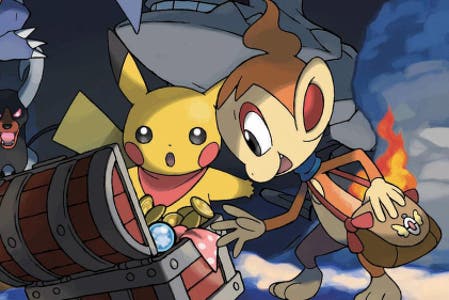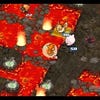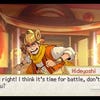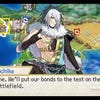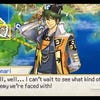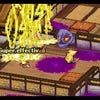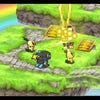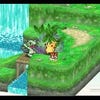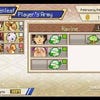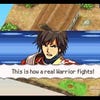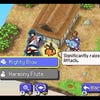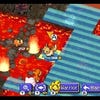Pokémon Conquest Review
Gotta crush 'em all.
Pokémon, it turns out, works so well as a strategy RPG that it's sort of weird nobody thought of trying it before. The critters themselves make for an excellent range of units, their array of strengths and weaknesses provides the ideal basis for the old rock, paper, scissors routine, and the trainers - sorry, warriors - they're linked to allow the designers to fling in a little meta-strategy, as you match the right man with the right monster. Not even a rather dry storyline about feudal empires and rival warlords can bog things down too much.
Actually, the plot isn't too bad. This is hardly the most memorable of narratives, but your race to unite the 17 kingdoms of Ransei before a dangerous enemy beats you to it adds a welcome element of time pressure to proceedings. It also neatly explains why you can be so keen on invading all your neighbours while still feeling like a hero when the dust has settled. If you don't bring them over to your cause, see, someone who you're told is far worse is going to do it. It's basically Bush-era foreign policy re-enacted with Meowths and Tepigs. Who doesn't want to be ground down under the cruel boot of a Meowth?
Mechanically, Conquest is pretty straightforward stuff. A blend of Pokémon and Koei's Nobunaga's Ambition series, you move your troops around the beautiful hand-drawn world map, invading enemies when their kingdoms appear, grinding for gold, defending strategically, strengthening your Pokémon and hunting for new ones in all of the locations you've already won over during any downtime.
The game moves along on a month-by-month basis, so it's up to you to decide whether you want to use a turn to mount an attack or simply shore up your forces. By the time you've got a decent number of warriors and Pokémon spread across your territories, though, you can do both quite easily, even delegating certain members of the gang to root out new units to tame, or to do a little training for you while you stick it to the next enemy on the list.
It's basically Bush-era foreign policy re-enacted with Meowths and Tepigs. Who doesn't want to be ground down under the cruel boot of a Meowth?
The odd fiddly menu aside, the management aspects of Conquest make for pretty entertaining stuff - and the options offered by your own kingdoms ensure that, even if you're not yet ready to take on the next major battle, you can still have a rumble in a friendly arena and level some of your own units while you're at it. The main event, though, is the tactical combat itself - and it's also the part where Conquest really shines.
Fights play out on isometric grid-based battlefields, most of which are fairly small, and all of which come with some kind of gimmick. One might be bisected by pools of lava, say, and filled with vents of deadly steam that pop up from time to time. Others might have jump pads or electrified plates or trap doors. One of my very favourites has huge Pokéball boulders you can knock around, striking rival troops and - occasionally - your own in the process.
It's a Pokémon-against-Pokémon world out here, but while the attacks offered - stripped down to a single move for each creature - might be familiar to fans of the core series, setting the battles within a defined landscape means that you have to take into account the placement of your critters, moving them into attack range, boosting their power by using terrain height, and minimizing any damage you might accidentally do to your own side as you go.
Each Pokémon has a handy passive ability and, on top of that, each one can turn to its warrior for help, with every guardian providing a skill that can be used once a match: restoring everyone's HP, say, raising defence or boosting energy. As with the traditional games, Pokémon can also carry items like potions or perks. If you're used to the main series, you'll be surprisingly at home.
Beyond the moment-to-moment action, you'll increasingly find yourself tasked with more complex management decisions - for instance, when you fight against a new enemy who comes with a very specific load-out of Pokémon. If your latest foe's packing grass type Pokémon, you'd better gather a group of fire Pokémon to take him down - and while you're at it, you should probably try mixing up the arrangement of Pokémon and warriors a little as you play. The perfect pairing will give you the best chance of improving the link between human and monster, thus boosting their stats and their growth potential.
If this is your introduction to strategy RPGs, Conquest is not without its depths, but it still reveals its inner workings at a pace that allows you to cope with the growing complexity on offer. The battlefield UI makes your movement and attack abilities enviably clear while matches limit the number of turns and provide very simple victory conditions.
There's nothing quite like dominating a deadly opponent by rolling up with the perfect team of six Pokémon and then dancing between one ideal spot on the map and the next as you fling down your attacks, but even if you haven't the patience for that kind of approach, you can still level a well-mixed gang until they're over-powered and barrel through quite a bit of the basic storyline using brute force. It will just take a little longer, and it won't feel quite as rewarding.
Across the campaign and its various offshoot scenarios, most of which are considerably harder, there's plenty of game to go around - and there are always those 200 Pokémon to track down, too, along with local wireless multiplayer. Regardless of your approach, the game looks quietly pretty, too, with a lovely colour scheme, nice, chunky battlefields, detailed portraits, and simple but extremely appealing models and animation for the monsters you wield.
Beyond all this, Pokémon Conquest is yet another (not so) final fling for the Nintendo DS. Conquest isn't just that rare Pokémon off-shoot that isn't a limping abomination - it's a reminder that the best consoles don't slip into the night very quietly. They stick around, defiantly showing up the machines that have replaced them.
That was true of the PS2, with its late releases that shamed so many early next-gen titles. It's true of the Dreamcast, which is still pumping out the odd shooter. It's true of the DS, too, which has boasted gems like this and Kirby's Mass Attack even as the 3DS slowly grows in strength from one game to the next.
It's not over yet, either, with main-line sequel Pokémon Black & White 2 due out this October. Even without that, though, Conquest would be one super effective swansong.
